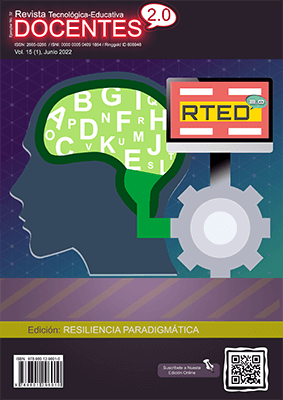Didactic Strategy for the Learning of Computer Legislation with the Use of Educational Technology
 DOI:
https://doi.org/10.37843/rted.v15i1.277
DOI:
https://doi.org/10.37843/rted.v15i1.277
Main Article Content
Abstract
Computer Legislation refers to the use of computer media; one of its main objectives is to protect and establish limitations and rules so that computing does not become a means by which the purposes for which it was created are diverted. This research aims to design a didactic model based on active learning through didactic strategies, supported by a technological platform to promote the teaching of laws and their articles related to computer crimes. The present investigation is framed under the deductive method, positivist paradigm, with a quantitative approach, of experimental design and descriptive type; however, the research will be carried out in the Faculty of Informatics of the Autonomous University of Querétaro, in which it will be handled with the use of a technological platform in which students can interact and thus obtain more excellent knowledge about the laws. The study seeks that students, with an active learning model as a tool, can have a perfect understanding of a specific subject. In addition, to know the importance of computer crimes and laws.
Downloads
Metrics
Article Details

This work is licensed under a Creative Commons Attribution-NonCommercial-NoDerivatives 4.0 International License.
Those authors who have publications in our journal accept the following terms:
- When a work is accepted for publication, the author retains rights of reproduction, distribution of his/her article for exploitation in all countries of the world in the format provided by our magazine and any other magnetic medium, optical, and digital.
- Authors will retain their copyright and guarantee the journal the right first to publish their work, which will be simultaneously subject to the Creative Commons Acknowledgment License (Attribution-NonCommercial-NoDerivatives 4.0 International (CC BY-NC-ND 4.0)). That allows third parties to copy and redistribute the material in any medium or format, under the following conditions: Acknowledgment - You must properly acknowledge authorship, provide a link to the license, and indicate if any changes have been made. You may do so in any reasonable way, but not in a way that suggests you have the licensor's endorsement or receive it for your use. NonCommercial - You may not use the material for a commercial purpose. NoDerivatives - If you remix, transform, or build from the material, you cannot broadcast the modified material. There are no additional restrictions - You cannot apply legal terms or technological measures that legally restrict you from doing what the license allows.
- Authors may adopt other non-exclusive license agreements to distribute the published version of the work (e.g., deposit it in an institutional archive or publish it in a monographic volume) provided that the initial publication in this journal is indicated.
- Authors are allowed and recommended to disseminate their work through the Internet (e.g., in institutional telematic archives, repositories, libraries, or their website), producing exciting exchanges and increasing the published work's citations.
- Request of withdrawal an article has to be done in writing by the author to the Editor, becoming effective after a written response from the Editor. For this purpose, the author or authors will send correspondence via e-mail: [email protected].
- The author will not receive financial compensation for the publication of his work.
- All Docentes 2.0 Journal publications are under the Open Journal System (OJS) platform at: https://ojs.docentes20.com/.
References
Arias, F. (2015). El proyecto de investigación. (Sexta ed.). Episteme. https:// es.slideshare.net/fidiasarias/fidias-g-arias-el-proyecto-de-investigacin-6ta-edición
Bergman (2008) Metodología de la Investigación. El Enfoque Cuantitativo – Metodologías de la Investigacion.
Cassou, J. (2008). Delitos Informáticos en México. https://doctrina.vlex.com.mx/vid/delitos-informaticos-mexico-75456707.
Dávila, N. (2006). El razonamiento inductivo y deductivo dentro del proceso investigativo en ciencias experimentales y sociales. Laurus, 180-205.
Delgado, M. & Solano, A. (2015). Estrategias didácticas creativas en entornos virtuales para el aprendizaje. https://www.researchgate.net/publication/2831911 l_Estrategias_didacticas_creativas_en_entornos_virtuales_para_el_aprendizaje
Esteban, J., & Ruiz, C. (1975). Delitos informáticos en México. 207–236.
Fernandez, J. (2016). Metodologías de la investigación. [jorgelfdez]. https://jorgelfdez.wordpress.com/2016/07/12/el-enfoque-cuantitativo/
Ferreres, V. & González A. (2006). Evaluación para la mejora de los centros docentes. Praxis.
García-Allen, J. (2015). Tipos de aprendizaje. https://psicologiaymente.com/desarrollo/tipos-de-aprendizaje
Labastidas, A. (1990). Revolución Informática con Independencia del Individuo. 448–456.
Flores-Rio, I. (2012). Política y legislación informática. Red Tercer Milenio S.C. https://www.aliat.click/BibliotecasDigitales/sistemas/Politica_y_legislacion_informatica.pdf
Mujica-Sequera, R. M. (2019). La tecnología en la educación. Revista Tecnológica-Educativa Docentes 2.0, 4(4), 4–7. https://doi.org/10.37843/rted.v4i4.57 DOI: https://doi.org/10.37843/rted.v4i4.57
Mujica-Sequera, R. M. (2020). Fundamentos de la Tecnología Educativa. Revista Tecnológica-Educativa Docentes 2.0, 8(1), 15–20. https://doi.org/10.37843/rted.v8i1.82 DOI: https://doi.org/10.37843/rted.v8i1.82
Muñoz-Torres, I. & Cuervo, J. (2000). Legislación Informática de México. http://www.informatica-juridica.com/legislacion/mexico/.
Narváez-Montenegro, D. (2015). El delito informático y su clasificación. Narvaez Montenegro, D.B. Núm, 2, 1–16.
Tamayo, M. (2012). El Proceso de la Investigación Científica. Limusa.
Téllez-Valdes, J. (2008). Derecho Informático. McGraw Hill.
Zambrano, J., Dueñas, K., & Macías, L. (2016). Delito Informático. Procedimiento Penal en Ecuador. Dominio de las Ciencias, 2(2), 204–215.






